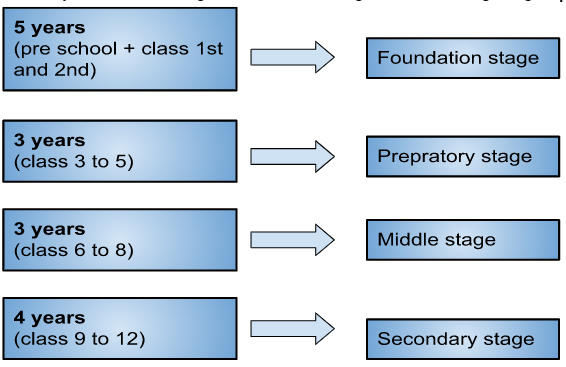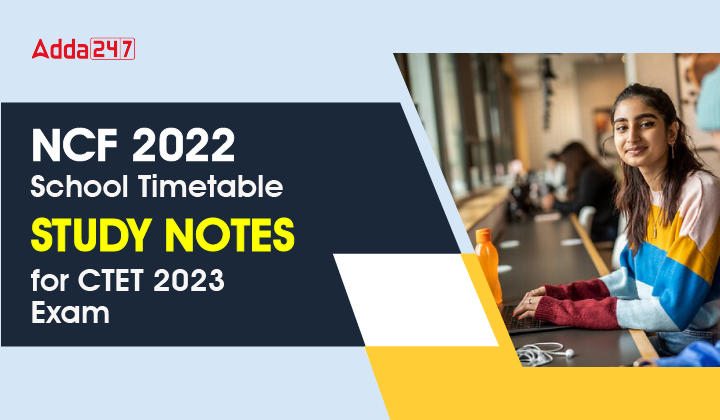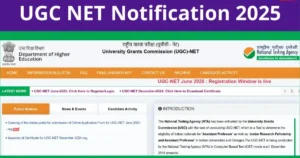Table of Contents
NCF 2022: Schools are the key institutes responsible for making arrangements that help to develop desirable values, capacities and knowledge in students. These arrangements include aspects like the appointment of teachers to teach subjects in school and managing curriculum aspects involving classroom interactions and enabling a positive learning environment etc. Out of these all sets of requirements, curriculum plays a prominent role.
NEP 2020
The NEP 2020 proposed schooling within four stages in a new 5+3+3+4 design covering ages 3-18. Therefore, a curricular framework for school education is also guided by 5+3+3+4 design which consisting four schooling stages:

School Time table by National Curriculum Framework 2022 (NCF 2022)
The timetable for the four stages of schooling has been suggested based on the vision of NEP and on considerations of child development, conceptual development, and the appropriate modes of inquiry at each age range. This timetable has been proposed differently for different stages:
Foundation stage
Children enjoy exploring the immediate environment when they are in their foundation stage. This stage is further subdivided into two:
- Timetable for ages 3-6:
There are multiple ways to organise the daily routine for children of ages 3-6. Institute must take into account the following points:
- Each activity may be planned keeping in mind the attention span of the child.
- There may be a balance between child-initiated and Teacher-guided activities
Below is the illustrative timetable suggested by NCF for children aged 3-6 years at Foundation Stage

This illustrative timetable has a five-and-a-half-hour school day with about four-and-a-half hours of active instructional time for children. Art and Craft, Outdoor Play and Free Play must have adequate time and focus during the day.
Preparatory stage:
Specific considerations for the preparatory stage are as follows:
- The timetable begins with an assembly for 25 minutes
- Class time for all subjects is 40 minutes.
- The transition time for students to prepare for the next class is 05 minutes
Below enlist the suggested annual hours and annual periods specified for each subject.

The Middle Stage:
The Middle Stage consists of three years of education for the age group of 11 to 14. This includes classes from 6th to 8th and is built on the pedagogical and curricular base of the Preparatory Stage. The following are the key points:
- The timetable is mostly alike the preparatory stage.
- At this stage, R3 is introduced to the children and requires moderate amounts of time to develop basic interpersonal communications skills only.
- Science, Social Science, and Vocational Education as new curricular areas introduced at this stage.

Secondary stage:
The secondary stage will consist of classes from 9th to 12th of age 14 to 18 years. There exist ample possibilities for maturation in thinking, learning, practising, and creative expression in this Stage. During this stage, students grapple with their changing bodies, may become self-conscious, and may be trying to make sense of their maturation. The following are the key points to be taken care of as per NCF:
- An assembly for 25 minutes with 05 minutes to reach the classroom.
- Class time for all subjects is 50 minutes.
- Some subjects will require a block period of 100 minutes (1 hour 40 minutes) for hands-on work, activities, lab work, and other such pedagogic requirements.
- The transition time for students to prepare for the next class is 05 minutes.

Hence, as per the National Curriculum Framework (NCF), every schooling stage has different aspects to deal with, especially the timetable. The foundation stage has four and a half of instructional time in which simple and playful techniques are used to teach children, the preparatory stage introduced two languages in the form of R1 and R2, and the children in the middle stage are introduced to more structured curriculum and at the secondary stage students are provided with different subject options in addition to hands-on work and activities.
Download School Timetable as per NCF 2022 PDF




 UGC NET Notification 2025 Out, Exam Date...
UGC NET Notification 2025 Out, Exam Date...
 Last Minute Preparation Tips for MP TET ...
Last Minute Preparation Tips for MP TET ...
 GAT B Cut Off 2025, Check Expected, Cate...
GAT B Cut Off 2025, Check Expected, Cate...














